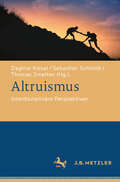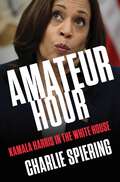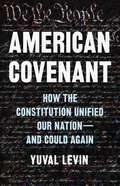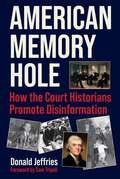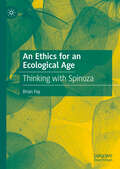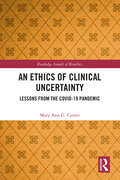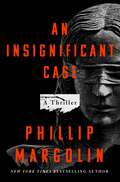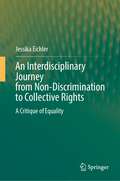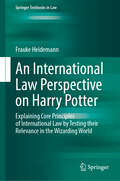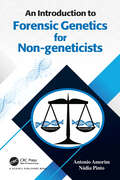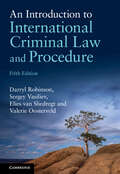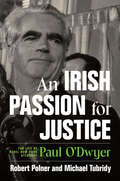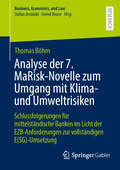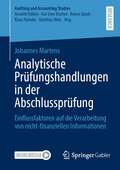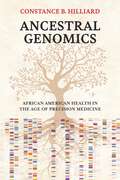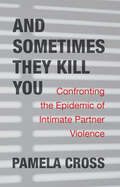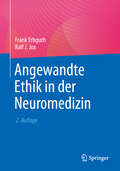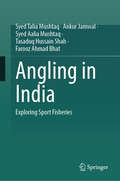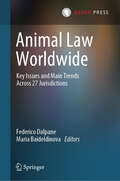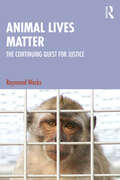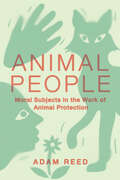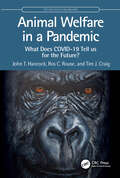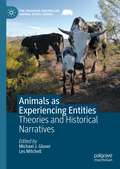- Table View
- List View
Altruismus: Interdisziplinäre Perspektiven
by Sebastian Schmidt Dagmar Kiesel Thomas SmettanAltruismus scheint im Alltagsverständnis seinen uneingeschränkt positiven Ruf als ebenso wünschenswerte wie seltene Tugend verloren zu haben und durch ein Ethos des Eigennutzens ersetzt worden zu sein. Angesichts globaler Krisen wie dem Klimawandel, großer Flüchtlingsbewegungen, Kriege und Armut ist die Bereitschaft zur Verhaltensänderung bzw. zum Verzicht zugunsten kommender Generationen oder hilfsbedürftiger Menschen weniger selbstverständlich als das Phänomen der psychologischen Reaktanz und die Weigerung, Einschränkungen der persönlichen Freiheit oder des Konsums hinzunehmen. Zeitgenössische Ethikerinnen und Ethiker müssen sich demnach mit der Frage nach der Motivation für ein Handeln auseinandersetzen, das in erster Linie nicht dem eigenen Wohl, sondern dem Wohl anderer dient. In diesem Sinne beleuchtet der vorliegende Band das Thema Altruismus in seinen verschiedenen, wechselseitig aufeinander verweisenden Facetten: Wie ist das Wesen altruistischen Handelns zu bestimmen? Liegt Altruismus in der Natur des Menschen? Lässt sich Altruismus widerspruchsfrei in verschiedene Ethiktypen einordnen? Wie verstehen verschiedene philosophische Traditionen und Religionen den Altruismus? In welchem Verhältnis steht der Altruismus zum guten Leben? Und: Wie ist altruistisches Handeln motiviert? Da diese Fragen in verschiedenen Fachwissenschaften und mit unterschiedlichen Perspektivierungen gestellt werden, ist dieser Sammelband interdisziplinär konzipiert: Philosophie und Religionswissenschaft kommen ebenso zu Wort wie Verhaltensökonomie und Evolutionsbiologie. Auch anthropologische, soziologische und psychologische Zusammenhänge werden beleuchtet. Dementsprechend richten sich die hier versammelten Aufsätze an ein sehr breit gefächertes akademisches Publikum, aber auch an eine interessierte öffentliche Leserschaft außerhalb des universitären Kontexts. Mit Blick auf diese Zielgruppen führen die einzelnen Beiträge in das jeweilige Thema ein und präsentieren gleichzeitig eine eigene Forschungsposition der Autorin bzw. des Autors.
Amateur Hour: Kamala Harris in the White House
by Charlie SpieringThe ultimate, comprehensive investigation into the life and career of Vice President Kamala Harris from former Washington Examiner and Breitbart News political reporter Charlie Spiering.Who is the real Kamala Harris? And how did she ascend to the second highest office in the country? Despite her limited experience in national politics and confusing professional history, there hasn&’t been a comprehensive examination of Vice President Kamala Harris&’s journey to the White House...until now. Find out how the San Francisco socialite turned politico fast-tracked her way onto the national stage, only to lose the faith of her base and her president. With exclusive reporting and a detective&’s eye, Charlie Spiering delivers the first-ever deep dive into Kamala Harris&’s hilarious, incompetent, radical path to the vice presidency. From her tumultuous tenure as California prosecutor to the fiery interrogator in the United States Senate, then to her disastrous presidential campaign and finally, her calamitous first years in executive office, this is an unfettered look at the woman who is only one heartbeat away from leading the free world.
American Apocalypse: The Six Far-Right Groups Waging War on Democracy
by Rena SteinzorA thorough analysis of the right-wing interests contributing to the downfall of American democracy The war on American democracy is at a fever pitch. Such a corrosive state of affairs did not arise spontaneously up from the people but instead was pushed, top-down, by six private sector special interest groups—big business, the House Freedom Caucus, the Federalist Society, Fox News, white evangelicals, and armed militias. In American Apocalypse Rena Steinzor argues that these groups are nothing more than well-financed armies fighting a battle of attrition against the national government, with power, money, and fame as their central motivations. The book begins at the end of Lyndon Johnson's presidency, when the modern regulatory state was born. Agencies like the Environmental Protection Agency and the Food and Drug Administration ensured that everything from our air to our medicine was safe. But efforts to thwart this "big government" agenda began swiftly, albeit in the shadows. Business leaders built a multi-billion dollar presence in the Capitol, and the rest of the six interest groups soon followed. While the groups do not coordinate their attacks, and sometimes their short-term goals even conflict, their priorities fall within a surprisingly tight bullseye: the size and power of the administrative state. In the near-term, their campaigns will bring the crucial functions of government to a halt, which will lead to immediate suffering by the working classes, and a rapid deterioration of race relations. Over the long-term, as the prevalence of global pandemics and climate crises increase, an incapacitated national government will usher in unimaginable harm. This book is the first to conceptualize these groups together, as one deconstructive and awe-inspiring force. Steinzor delves into each of their histories, mapping the strategies, tactics, and characteristics that make them so powerful. She offers the most comprehensive story available about the downfall of American democracy, reminding us that only by recognizing what we are up against can we hope to bring about change.
American Covenant: How the Constitution Unified Our Nation—and Could Again
by Yuval Levin&“The most important voice in the political culture&” (Ben Shapiro) reveals the Constitution&’s remarkable power to repair our broken civic culture, rescue our malfunctioning politics, and unify a fractious America Common ground is hard to find in today&’s politics. In a society teeming with irreconcilable political perspectives, many people have grown frustrated under a system of government that constantly demands compromise. More and more on both the right and the left have come to blame the Constitution for the resulting discord. But the Constitution is not the problem we face; it is the solution. Blending engaging history with lucid analysis, conservative scholar Yuval Levin&’s American Covenant recovers the Constitution&’s true genius and reveals how it charts a path to repairing America&’s fault lines. Uncovering the framers&’ sophisticated grasp of political division, Levin showcases the Constitution&’s exceptional power to facilitate constructive disagreement, negotiate resolutions to disputes, and forge unity in a fractured society. Clear-eyed about the ways that contemporary politics have malfunctioned, Levin also offers practical solutions for reforming those aspects of the constitutional order that have gone awry. Hopeful, insightful, and rooted in the best of our political tradition, American Covenant celebrates the Constitution&’s remarkable power to bind together a diverse society, reassuring us that a less divided future is within our grasp.
American Memory Hole: How the Court Historians Promote Disinformation
by Donald JeffriesDonald Jeffries takes another deep dive down the historical rabbit holes with American Memory Hole: How the Court Historians Promote Disinformation. You will discover how cancel culture was born during the administration of Franklin D. Roosevelt. And how our interventionist foreign policy was established during the Woodrow Wilson presidency. Jeffries documents the tragically common atrocities committed by US troops, beginning with the Mexican-American War, which became official policy under the &“total war&” and &“scorched earth&” strategy of Abraham Lincoln&’s bloodthirsty generals. He recounts the shocking abuses of our military forces, in countries like Mexico, Haiti, the Philippines, and elsewhere. Jeffries builds on his groundbreaking investigation into the murder of John F. Kennedy, Jr., uncovering even more evidence of conspiracy and cover-up. He talked to people no researcher has talked to before, in a powerful new section on the assassination of President John F. Kennedy. Jeffries explores the Kennedy family in general, and finds that the establishment, especially the Left, continues to treat them unfairly. The events of September 11, 2001, and the Oklahoma City Bombing are investigated in depth as never before. There is stunning new information on much maligned Senator Joseph McCarthy, who emerges here not as some irredeemable monster, but as a genuine American patriot who has been demeaned in death even more than he was in life. The reader will never look at the supposed heroes and villains of American history the same way again after reading this book. History is written by the victors.
American Reckoning: Inside Trump's Trial—and My Own
by Jonathan AlterA vivid eyewitness account of the historic first criminal trial of a president and a cri de coeur for democracy from a New York Times bestselling author and presidential historian.As one of a handful of journalists allowed in the courtroom, for 23 days Jonathan Alter sat just feet away from the most dangerous threat to democracy in American history, watching the spectacle of the century: the felony trial of Donald Trump. Highly publicized but untelevised and thus largely hidden from public view, this landmark trial offered hope of real justice amid a grueling eight-year national ordeal and foreshadowed the drama of the 2024 presidential election. Alter shares everything he witnessed—from eviscerating takes on the colorful characters to the chilling legal ups and downs—to offer a barbed account of the trial and its aftermath, including fresh reporting about the historic events of the summer of 2024. A Zelig of journalism experiencing a crisis of faith in the good sense of the American people, Alter chronicles the shaping of his political consciousness and his bracing, unpredictable relationships with Jimmy and Rosalynn Carter, Bill and Hillary Clinton, Barack Obama, John McCain, and Joe Biden, whose decision to stand down in favor of former prosecutor Kamala Harris put the criminal trial front and center as Americans rendered their own verdict at the polls. Deeply personal and passionate, American Reckoning is an eye-opening book from a journalist with a front row seat on history, offering a troubled yet hopeful look at our national moment of truth.
An Ethics for an Ecological Age: Thinking with Spinoza
by Brian FayThis book presents a comprehensive vision of human life, ecology, and theology inspired by Spinoza. According to this vision, human beings and all other natural entities are not independent substances but are rather “modes” of nature, meaning that they are fleeting manifestations of nature’s conatus. By intuitively (and not just intellectually) recognizing ourselves to be modes of nature, we can more fully realize ourselves. To achieve this requires a radical rethinking of our world, of ourselves, and of God, and a far richer understanding of ecology, and an ethics grounded in ecology, than those in current usage. Brian Fay explores this rethinking, and the result is a new, far-reaching vision of our world and how to be responsible, thriving agents in it.
An Ethics of Clinical Uncertainty: Lessons from the COVID-19 Pandemic (ISSN)
by Mary Ann CutterThis book explores the ethical implications of managing uncertainty in clinical decision-making during the COVID-19 pandemic. It develops an ethics of clinical uncertainty that brings together insights from the clinical and biomedical ethical literatures.The book sets out to recognize the central role uncertainty plays in clinical decision-making and to acknowledge the different levels, kinds, and dimensions of clinical uncertainty. It also aims to aid clinicians and patients in managing clinical uncertainty and to recognize the ethical duty they have to manage clinical uncertainty. The book addresses four ethical duties related to clinical uncertainty: (1) to advance the welfare of those in clinical medicine, (2) to respect the rights of those in clinical medicine, (3) to promote just access to health care, and (4) to care for one another in clinical medicine. These duties took on select urgency during the COVID-19 pandemic because clinical risk assessments about COVID-19 were limited, we were asked to give informed consent in the context of limited and changing knowledge, the pandemic unearthed myriad problems about the distribution of health care, and the pandemic raised questions about how we care for each other in medicine.An Ethics of Clinical Uncertainty will appeal to scholars, advanced students, and medical professionals working in philosophy of medicine, biomedical ethics, clinical medicine, nursing, public health care, and gerontology.
An Insignificant Case: A Thriller
by Phillip MargolinA new standalone legal thriller from the international bestselling author of GONE, BUT NOT FORGOTTEN.Charlie Webb is a third rate lawyer who graduated from a third rate law-school and, because he couldn’t get hired by any of the major law firms, has opened his own law firm, where he gets by handling cases for dubious associates from his youth and some court appointed cases. Described as “a leaky boat floating down the stream of life,” Charlie has led unremarkable life, personally and professionally. Until he’s appointed to be the attorney for a decidedly crackpot artist who calls himself Guido Sabatini (born Lawrence Weiss). Sabatini has been arrested – again – for breaking into a restaurant and stealing back a painting he sold them because he was insulted by where it was displayed. But as Lawrence Weiss, he’s also an accomplished card shark and burglar and while he was there, he stole a thumb drive from the owner’s safe.Not knowing what else Sabatani has stolen, Webb negotiates the return of the painting and “other items’ for the owner dropping charges against Sabatini. But the contents of the flash drive threatens very powerful figures who are determined to retrieve it, the restaurant owner (Gretchen Hall) and her driver (Yuri Makarov) are being investigated for the sex trafficking of minors, and there are others who have a violent grudge against Sabatini. When a minor theft case becomes a double homicide, and even more, Charlie Webb, an insignificant lawyer assigned to an insignificant case, is faced with the most important, and deadliest, case of his life. Going back to his long-time bestselling roots, Phillip Margolin returns with a brilliant standalone legal thriller in the tradition of John Grisham.
An Interdisciplinary Journey from Non-Discrimination to Collective Rights: A Critique of Equality
by Jessika EichlerThis book develops a critique of the equality paradigms and principles to be found in the majority of today’s legal orders. It accompanies the reader taking her/him/x from a critique of non-discrimination and equality to the ‘opposite’ end of the spectrum, that is, to collective rights, collectivization processes and a manifestation of recognition that is based on difference. This interdisciplinary, theoretical journey explores a multiplicity of (legal) orders in terms of how they provide spaces of articulation for ‘difference’. The book draws, emblematically, on the rights of indigenous peoples as well as recognized and unrecognized cultural, ethnic, linguistic and religious minorities. The book thereby builds on legal and political theory, which ultimately proves essential given the dedicated objective of the book, that is, to introduce a variety of recognition principles and what the author terms ‘scales of collectivization’, which facilitate a better understanding of collective rights and further ways to capture, define and ultimately measure these rights.
An International Law Perspective on Harry Potter: Explaining Core Principles of International Law by Testing their Relevance in the Wizarding World (Springer Textbooks in Law)
by Frauke HeidemannThis textbook introduces readers to international law by linking it to the Harry Potter universe. Given the current changes in the international sphere away from a state-centric system to a multitude of non-state actors, it tests the legal regime by applying it to the out-of-the-box concept of wizards and thus rids the doctrinal debate of political factors. More specifically, the book explains core concepts of public international law, covering the elements of a state, state responsibility, jurisdiction, enforcement of international law and immunity. In the wizarding world, it addresses questions of statehood by discussing when a wizarding state is responsible for the crimes committed by its wizards, who has jurisdiction over crimes, and how international law is enforced. In addition, it introduces and explains the fundamentals of international humanitarian law, international human rights law, international criminal law, and air law by applying them to the wizarding world. The textbook is intended for anyone looking for an accessible introduction to public international law and its application.
An Introduction to Forensic Genetics for Non-geneticists
by Antonio Amorim Nádia PintoThis book aims to enable non-experts in Genetics to understand the contribution of this science to resolve civil or criminal litigations, analysing evidence of human and non-human origins. The main difficulties in the comprehension and misuse of the results of Forensic Genetics reside in the lack of effective communication between geneticists and the users of the produced information (as lawyers and judges) and do not arise primarily from the lack of knowledge of genetics. Therefore, instead of a classical handbook we use a question-and-answer approach, which meets this interfacial essence. Questions that can be addressed by genetic expertise are typified and for each of them we provide the possible expert report, presenting the essential biological and statistical genetics background in the form of boxes/appendices, along with exemplary cases. Legal, ethical, and theoretical limitations of Forensic Genetics are discussed, formulating questions that cannot, or should not, be addressed by this applied science.
An Introduction to International Criminal Law and Procedure
by Darryl Robinson Sergey Vasiliev Valerie Oosterveld Elies van SliedregtBuilding on the success of previous editions (Cryer et al.), this popular textbook is now expanded and updated in a 5th edition featuring two new co-authors, Elies van Sliedregt and Valerie Oosterveld. A market leader and one of the most globally trusted textbooks on international criminal law, it is known for its accessible and engaging tone and for an even-handed approach that is both critical and constructive. Comprehensively updated and rewritten, this new edition introduces readers to the main concepts of international criminal law, as well as the domestic and international institutions that enforce it, and addresses the latest challenges and controversies surrounding the International Criminal Court. Written by a team of international criminal lawyers who have extensive academic and practical experience in the field, the book engages with critical questions, political and moral challenges, and alternatives to international justice. It contains helpful references to other literature, making it a valuable research resource.
An Irish Passion for Justice: The Life of Rebel New York Attorney Paul O'Dwyer
by Robert Polner Michael TubridyAn Irish Passion for Justice reveals the life and work of Paul O'Dwyer, the Irish-born and quintessentially New York activist, politician, and lawyer who fought in the courts and at the barricades for the rights of the downtrodden and the marginalized throughout the 20th century.Robert Polner and Michael Tubridy recount O'Dwyer's legal crusades, political campaigns, and civic interactions, deftly describing how he cut a principled and progressive path through New York City's political machinery and America's reactionary Cold War landscape. Polner and Tubridy's dynamic, penetrating depiction showcases O'Dwyer's consistent left-wing politics and defense of accused Communists in the labor movement, which exposed him to sharp criticism within and beyond the Irish-American community. Even so, his fierce beliefs, loyalty to his brother William, who was the city's mayor after World War II, and influence in Irish-American circles also inspired respect and support. Recognized by his gentle brogue and white pompadour, he fought for the creation of Israel, organized Black voters during the Civil Rights movement, and denounced the Vietnam War as an insurgent Democratic candidate for US Senate. Finally, he enlisted future president Bill Clinton to bring an end to the Troubles in Northern Ireland. As the authors demonstrate, O'Dwyer was both a man of his time and a politician beyond his years.An Irish Passion for Justice tells an enthralling and inspiring New York immigrant story that uncovers how one person, shaped by history and community, can make a difference in the world by holding true to their ideals.
Analyse der 7. MaRisk-Novelle zum Umgang mit Klima- und Umweltrisiken: Schlussfolgerungen für mittelständische Banken im Licht der EZB-Anforderungen zur vollständigen E(SG)-Umsetzung (Business, Economics, and Law)
by Thomas BöhmDie Europäische Zentralbank stellte in ihrer Mitteilung vom 02. November 2022 klar, dass alle Banken die regulatorischen Anforderungen zum Umgang mit Klima- und Umweltrisiken bis spätestens Ende 2024 vollständig erfüllen müssen. Mit der 7. Novelle hat die Bundesanstalt für Finanzdienstleistungsaufsicht (BaFin) ESG-Risiken in ihre Mindestanforderungen an das Risikomanagement (MaRisk) der Banken übernommen. In diesem Werk werden die aufsichtlichen ESG-Erwartungshaltungen von EZB, EBA und BaFin dargelegt und miteinander verglichen. Die Arbeit zeigt Ansätze auf, wie mittelständische Institute angemessen mit Klima- und Umweltrisiken in der Banksteuerung umgehen können. Dabei wird deutlich, dass in einer konsequenten institutsspezifischen Umsetzung, neben der Reduzierung möglicher Risiken, auch viele Chancen in Form neuer Geschäftsfelder, gesteigerter Ertragschancen und Imagegewinn liegen.
Analytische Prüfungshandlungen in der Abschlussprüfung: Einflussfaktoren auf die Verarbeitung von nicht-finanziellen Informationen (Auditing and Accounting Studies)
by Johannes MartensIn der Abschlussprüfung werden neben Informationen aus der traditionellen Analyse von finanziellen Daten zunehmend Informationen aus der Analyse von nicht-finanziellen Daten berücksichtigt. Die Nutzung von nicht-finanziellen Informationen ist hierbei kein neues Phänomen, jedoch ermöglichen jüngere datenanalytische Verfahren, wie z. B. Text-Data-Mining, die Auswertung bisher wenig beachteter, unkonventioneller Datenquellen, die zunehmend in die prüferische Urteilsfindung Eingang finden. In diesem Zusammenhang wird in dieser Arbeit aus einer verhaltenswissenschaftlichen Perspektive untersucht, welche Bedeutung nicht-finanzielle Informationen aus der Analyse von Wetter-, Strom- und Internetdaten zur Plausibilisierung der Umsatzerlöse im Rahmen einer analytischen Prüfungshandlung für Prüfer besitzen. Hierfür wird eine experimentelle Untersuchung mit Prüfern durchgeführt, die drei wesentliche Faktoren bei der Verarbeitung der nicht-finanziellen Informationen fokussiert: das Bedürfnis nach kognitiver Geschlossenheit, die Informationskonsistenz und der fraud-Risiko-Kontext. Die Ergebnisse deuten unter anderem auf einen Einfluss des Bedürfnisses nach kognitiver Geschlossenheit und der Informationskonsistenz hin. Die Befunde liefern interessante Einsichten für Prüfungspraxis und -forschung.
Ancestral Genomics: African American Health in the Age of Precision Medicine
by Constance B. HilliardA leading evolutionary historian offers a radical solution to racial health disparities in the United States.Constance B. Hilliard was living in Japan when she began experiencing joint pain. Her doctor diagnosed osteoarthritis—a common ailment for someone her age. But her bloodwork showed something else: Hilliard, who had never had kidney problems, appeared to be suffering from renal failure. When she returned to Texas, however, a new round of tests showed that her kidneys were healthy. Unlike the Japanese doctor, her American primary care provider had checked a box on her lab report for “African American.” As a scholar of scientific racism, Hilliard was perplexed. Why should race, which experts agree has no biological basis, matter for getting accurate test results?Ancestral Genomics is the result of Hilliard’s decade-long quest to solve this puzzle. In a masterful synthesis of evolutionary history, population genetics, and public health research, she addresses the usefulness of race as a heuristic in genomic medicine. Built from European genetic data, the Human Genome Project and other databases have proven inadequate for identifying disease-causing gene variants in patients of African descent. Such databases, Hilliard argues, overlook crucial information about the environments to which their ancestors’ bodies adapted prior to the transatlantic slave trade. Hilliard shows how, by analyzing “ecological niche populations,” a classification model that combines family and ecological histories with genetic information, our increasingly advanced genomic technologies, including personalized medicine, can serve African Americans and other people of color, while avoiding racial essentialism.Forcefully argued and morally urgent, Ancestral Genomics is a clarion call for the US medical community to embrace our multigenomic society.
And Sometimes They Kill You: Confronting the Epidemic of Intimate Partner Violence
by Pamela CrossDespite decades of activism by feminists and their allies, women and their children continue to be killed by their partners and former partners in shocking numbers, leading the federal government to describe intimate partner violence (IPV) as an epidemic in Canada. Why have we failed to respond effectively to a social problem that affects millions of women and children? After working for more than three decades with survivors, frontline workers, and the systems they turn to for help, lawyer Pamela Cross provides an in-depth look at intimate partner violence in Canada. And Sometimes They Kill You untangles what intimate partner violence is, the barriers to its eradication, and what we could be doing to eliminate those barriers. Told in an engaging and accessible fashion, the book weaves together Cross’ personal experiences and reflections on what she has learned with the heartbreaking stories of victims, survivors, and the alarming but convincing data. Cross offers practical and hopeful ideas for how each of us can engage in the vital work of eradicating intimate partner violence. This a call-to-action for the all-of-society, revolutionary response to gender-based violence needed to build communities that are safe and healthy for everyone.
Angewandte Ethik in der Neuromedizin
by Ralf J. Jox Frank ErbguthAnhand ausgewählter klinischer Situationen in der Neuromedizin zeigt dieses Buch, wie die wissenschaftliche Reflexion auf dem Gebiet der Neuroethik praktisch angewendet werden kann. Es richtet sich primär an Ärztinnen und Ärzte sowie an alle anderen Gesundheitsberufe, die in den Bereichen der Neuromedizin mit ethischen Fragen konfrontiert sind, die sich speziell in ihrem Tätigkeitsbereich ergeben. Indem es den klinischen Kontext in den Blick rückt, schließt das Werk die Lücke zwischen Einführungsbüchern und wissenschaftlichen Handbüchern zur Neuroethik. Das breite Themenspektrum wurde für die vollständig aktualisierte 2. Auflage um ein Kapitel zum gegenwärtigen Einsatz von Künstlicher Intelligenz in der Neuromedizin erweitert. Herausgegeben von einem Krankenhausneurologen und einem wissenschaftlich tätigen Neuroethiker, enthält das Buch Beiträge von Expertinnen und Experten aus verschiedenen Disziplinen und Ländern.
Angling in India: Exploring Sport Fisheries
by Ankur Jamwal Syed Talia Mushtaq Syed Aalia Mushtaq Tasaduq Hussain Shah Farooz Ahmad BhatThis book discusses the diverse array of aquatic life of Indian waters, including rivers, lakes, and coastal regions. This book is a useful manual as it explores the historical and cultural background of fishing in the country. It highlights the need of ethical fishing methods and the crucial part fishermen play in protecting the aquatic habitats. This book also covers lesser-known fishing locations and thus promotes a conservation and sustainable tourism mindset. It promotes environmental awareness and care with a focus on highlighting Indian biodiversity. Further, it offers vital details on licenses, rules, and equipment used in angling. Emphasis has been given on responsible angling and the role of anglers in aquatic biodiversity conservation efforts. This book acts as an instruction manual for anyone wishing to discover, comprehend, and safeguard the country's unique sport fisheries. It is also relevant to environmentalists and conservation advocates. Scholars and researchers in the fields of ecology, environmental science, and cultural studies will also benefit from this book for academic purposes and for understanding the cultural and ecological dimensions of angling in India.
Animal Law Worldwide: Key Issues and Main Trends Across 27 Jurisdictions
by Federico Dalpane Maria BaideldinovaThis book offers a unique panoramic survey of the state of animal law in twenty-six countries and in the legal system of the European Union. The authors give a brief introduction to each jurisdiction, examine key issues, and formulate recommendations. The contributions provide ample opportunities for legal comparative studies touching on constitutional law, criminal law, civil law, environmental law, and administrative law, and discuss the crucial role of NGOs and civil society in raising awareness for the plight of animals. The contributions show the mature stage reached by the discipline of animal law, which is gaining attention in wider circles. The book discusses wildlife, agricultural animals, experimental animals, service animals, stray animals, and others. One of the topics is the constitutionalisation of animal welfare (with a growing number of countries amending their constitutions to include the protection of animals or considering such amendments). Other topics include the trend of moving away from the age-old legal classification of animals as mere things, and the persistent weaknesses in the implementation of legal provisions for the protection of animals. This book will be of keen interest to the worldwide animal law community, legal comparatists, legal theorists, policy makers, judges, law enforcement officials, as well as veterinary doctors. Federico Dalpane is an assistant professor at KIMEP University, College of Social Sciences. Maria Baideldinova is an assistant professor at KIMEP University, School of Law.
Animal Lives Matter: The Continuing Quest for Justice
by Raymond WacksAnimal Lives Matter provides a comprehensive analysis of the legal, philosophical, and ethical aspects of animal rights. It argues that the subject extends beyond the matter of our obligations towards animals, to include our wider responsibilities for protecting the environment. Drawing on numerous moral, political, legal, religious, and philosophical theories including utilitarianism, deontology, rights theory, social contractarianism, and the capabilities approach, the author meticulously examines the questions of sentience, speciesism, personhood, and human exceptionalism. Lucid, nuanced, and academically rigorous, this important book will be an essential resource for scholars of law, politics, philosophy, ethics, as well as policy makers and the general reader.
Animal People: Moral Subjects in the Work of Animal Protection (Expertise: Cultures and Technologies of Knowledge)
by Adam ReedAnimal People introduces readers to the professionalized world of animal protection from the perspective of those who consider themselves to be "moderate" activists. Adam Reed explores the interrelationships between moral cause and organizational culture, including the ways in which expert roles such as investigator and lobbyist inform the practice and outlook of animal protection. This book examines not only connections between forms of professionalism and everyday advocacy but also how those working to improve the welfare of animals can come to possess an expertise in public or mainstream ethics.Reed explores these issues through the example of a Scottish-based animal protection organization. Animal People makes a distinctive contribution to anthropological debate and discussion relating to human and nonhuman animal interactions, activism, and the attributions and imperatives of moral action.
Animal Welfare in a Pandemic: What Does COVID-19 Tell us for the Future? (CRC One Health One Welfare)
by John T. Hancock Ros C. Rouse Tim J. CraigAnimal Welfare in a Pandemic explores the impact of COVID-19 on a wide array of animals, from those in the wild to companion and captive animals. During the height of the pandemic, a range of animals were infected, and many died, but this was hard to predict, even using up-to-date bioinformatics. Lockdowns around the world had, and continue to have, a major effect on animals’ welfare, influencing pet ownership and care, as well as impacting on the work of conservation institutes due to the lack of visitors and funding and lack of tourist presence in the wild which impacted on anti-poaching efforts. Some of the vast amount of personal protection equipment (PPE) that was distributed was discarded, creating both dangers and occasional opportunities for wild animals. With the rollout of human vaccines, some countries started developing animal vaccines, only some of which were deployed. In summary, the pandemic had a wide-ranging influence on animal welfare around the world. This is reviewed to highlight what can be learned to protect and enhance animal welfare in future epidemics/pandemics, and contribute to a genuinely One Health approach where the health and welfare of both humans and animals are considered holistically.This book is authored by members of the University of the West of England, Bristol, who span a range of expertise in Biological Sciences, Social Sciences, Animal Welfare, and Ethics.
Animals as Experiencing Entities: Theories and Historical Narratives (The Palgrave Macmillan Animal Ethics Series)
by Les Mitchell Michael J. GloverThis volume explores the experiences of those with little or no power—usually, although not exclusively, animals. The theme of animals as experiencing entities is what links the chapters and characterises the volume. Broadly each author in this volume contributes in one of two ways. The first group, in Section 1, theoretically engages animal subjectivity, animal experiences, and ways in which these are to some extent accessible and knowable to humans. The second group of authors, in Section 2, offer narrative accounts about specific animals or groups of animals and explore to some extent their subjective historical experiences. In summary, the first section diversely theorises about animal experiences, while the second section’s authors assume animals’ subjective experiences and construct narratives that take into account how animals might have subjectively experienced historical phenomena.
